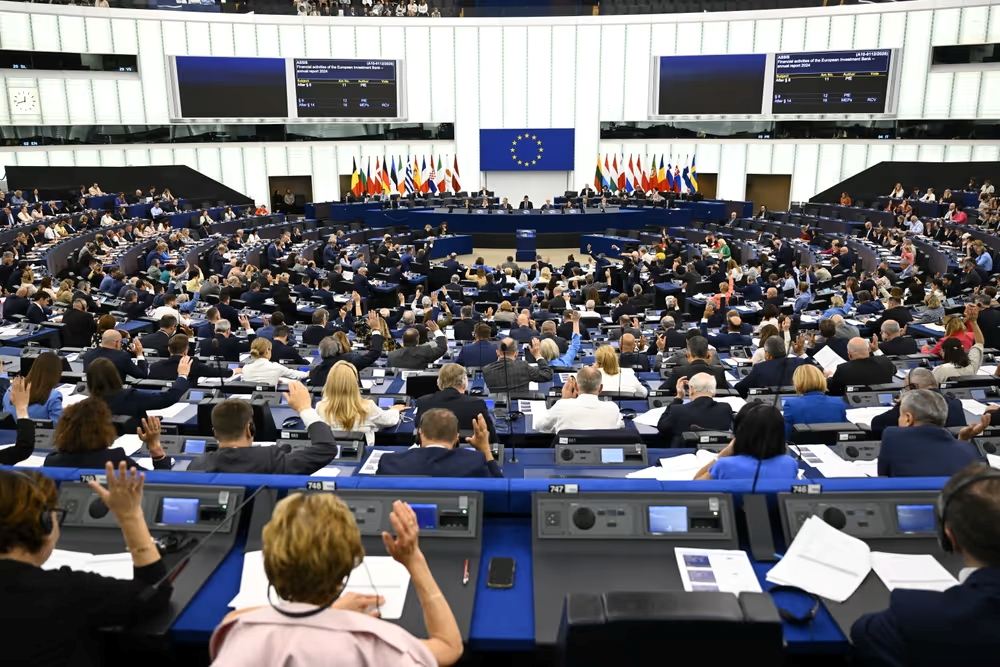
The European Parliament has called for coordinated European action against Russia’s hybrid aggression, endorsing the creation of a “drone wall” and stronger cooperation with NATO to safeguard European airspace and critical infrastructure.
In a resolution adopted in Strasbourg on 9 October with 469 votes in favour, 97 against and 38 abstentions, MEPs stated that recent Russian drone and fighter jet incursions into the airspace of Denmark, Sweden, Norway, Poland, Estonia and Romania constitute deliberate acts of hybrid warfare. They urged the EU to take “any initiative” to ensure a “coordinated, united and proportionate action against all violations of airspace, including shooting down airborne threats.”
In particular, Parliament endorsed the creation of a European anti-drone shield - the so-called “drone wall” - and the “Eastern Flank Watch”, designed to protect Member States exposed to direct threats. These measures are part of a layered European air and missile defence system, fully interoperable with NATO’s architecture.
The initiative, first announced by Commission President Ursula von der Leyen during her State of the Union address, aims to establish a cost-effective interception network capable of neutralising airborne threats without relying solely on expensive missile systems - the kind NATO used to shoot down drones over Poland earlier this year.
However, the proposal has sparked growing scepticism among some Member States over feasibility and cost. While Baltic and Scandinavian countries strongly support the plan, France and Germany have recently expressed reservations, viewing it as overly ambitious and politically or technically too complex.
Elsewhere, southern Member States - including Spain, Greece and Italy - have called for a “360-degree vision” that balances attention between the eastern and southern flanks. They argue that Europe’s vast borders and the instability of the Mediterranean region also demand strategic focus. Spain warned that other challenges such as the climate crisis and Mediterranean instability also threaten security. Others urged that deterrence be balanced with diplomacy and continued support to Ukraine.
But von der Leyen addressed some of these concerns on 8 October, describing the “drone wall” as central to the EU’s defensive strategy while reaffirming its comprehensive reach. “This will monitor and protect the skies, seas and ground of our eastern members — but get me right, it is not only about our eastern border. At the moment, it’s our priority, but what we need is a 360° approach. This anti-drone system will be a shield for our entire Union, including of course the southern flank,” she said in Strasbourg.
Beyond the drone wall
In its resolution, Parliament also called for further progress toward a European Defence Union, enhancing capability planning, intelligence sharing and joint procurement, while remaining complementary to NATO. The resolution demands an EU action plan against hybrid warfare “in terrestrial, aerial, maritime and digital domains”, and urges faster development of interoperable defence systems under PESCO and the European Defence Fund, with greater investment in drones and counter-drone technologies.
It also calls on the Council and Commission to strengthen sanctions to “definitively undermine Russia’s ability to continue waging its brutal war of aggression.” MEPs urged adoption of a robust 19th sanctions package targeting Russia’s key revenue sources and extending penalties to Belarus, Iran, North Korea, and — for the first time — Chinese entities providing dual-use goods for drone and missile production.
Unity and division
The broad support for the resolution was expected, but the debate exposed enduring divisions over the scope of Europe’s defence ambitions.
Several MEPs pressed for a firmer line against Moscow. Andrzej Halicki (EPP) declared: “I am very happy with the proposals of the Commission President and Mr. Kubilius. I think the only thing Russia understands is power, so the unity of our countries is vital.”
Iratxe García Pérez, S&D leader, insisted that appeasement was futile: “It doesn't make sense to appease - it never has worked and never will. Putin never wanted peace - not in Georgia, Crimea, Donbas or across Ukraine. Putin will only negotiate when he feels that he is losing. We need a European defence industry which is capable of action, a European pillar within NATO, a joint anti-drone defence.”
Others warned against escalation. Pierre-Romain Thionnet (PfE) argued that overreaction could backfire: “Shooting everything that comes in is counterproductive; it feeds Russian propaganda of being a victim.”
From the Left, some MEPs voiced strong opposition. One said: “European citizens don’t believe anymore in this fund-aligned approach - not because of what Putin says, but because they’re tired of lies and of this perpetual attempt at war.
Despite criticism, a motion of no confidence tabled by sceptical parties against von der Leyen failed to pass, ensuring her “drone wall” initiative remains on the agenda ahead of the European Council meeting on 23–24 October along with a strenghtening of EU defence.
More in general, the resolution, even though it has no legislative effect on EU institutions or Member States, carries strong moral and political weight, representing the only way in which the European people as such can express themselves. In this sense, it stands as a symbolic act of unity and democratic expression, reflecting the political will of a continent under pressure.








